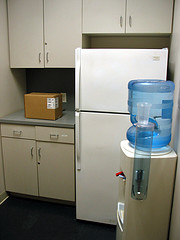New York Times reportor, Lisa Belkin, tries to justify “wasted time” at work in her Life’s Work column.
She cites a study by Microsoft on productivity in the workplace. Microsoft found that out of the average 45 hour work week, 16 of those hours were “wasted.” The biggest culprit was useless meetings, with respondents saying that they spend more then 5 hours a week in meetings and 71% of them are “not productive.”
I love the quote from “personal development expert” Steve Pavlina who says, “the average full-time worker doesn’t even start doing real work until 11:00 a.m., and begins to wind down around 3:30 p.m.†He also goes on to mention that employees work an average of 1.5 hours a day.
Being unproductive today is much easier than past working generations. Here we see true signs of technical progress. How did people waste time at the office before web surfing, IM, email, mobile phones and desktop computers? How unproductive can really by making personal calls and talking by the water cooler?
Our plenitude of slacking options may not end up being something celebrated or cherished forever. In that, Belkin closes by citing a growing trend of ROWE, or Results Only Work Environment. The oft cited example is Best Buy’s move to allow corporate employees to set their own schedules. As long as work get done and goal are met, mid-day movies and downtown brunches are all fine. She notes that “output and job satisfaction have jumped wherever ROWE is tried.”
ROWE is definitely a trend to track; however, I’m not convinced it’s the savior for worker. If it does spread, it will accelerate our distributed work lives, where work life and personal life blend into one. With ROWE, will we be freed from our artbitary office hours, or will we be checking work at 1 am? Will ROWE be liberate us from the office, or permanmently force us to take our office wherever we go?




